Searching for information on how to lower your basement humidity level? If so, don’t hit that back button because you’ve landed on the right page. In this article, we’ll review the correct humidity level for a basement, what causes high basement humidity, why you don’t want a humid basement, and how to lower the humidity level in your home’s basement.
What Should the Humidity Level in Your Basement Be?
The ideal humidity level in your basement should be between 30% to 50%. Anything below 30% can cause discomfort, dryness, and a buildup of static electricity.
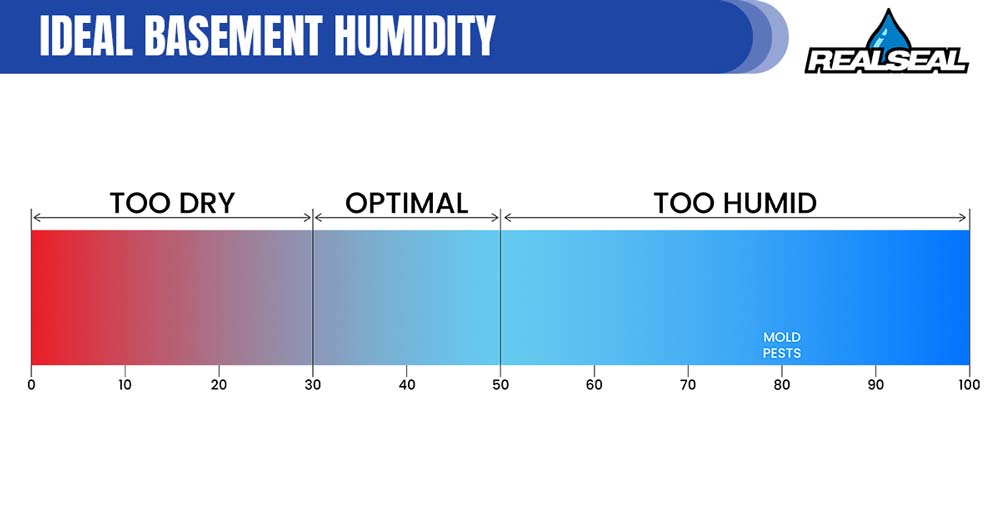
Humidity levels above 50% can lead to mold growth, a musty odor, and damage to wooden structures, furniture, carpeting, etc. High humidity levels can also attract pests like rodents and insects, making your basement unhealthy and unsanitary.
What Causes High Basement Humidity?
High basement humidity can be caused by a variety of factors, including the following:
- Basements are below grade – Basements are below grade, which means they are surrounded by soil, which is naturally moist.
- Open windows – Open basement windows allow warm, humid air from outside to enter. This air can then condense on cooler surfaces, leading to moisture buildup. In areas with high humidity levels, this problem can be especially severe.
- Moisture from new concrete – Moisture from new concrete can also add to the humidity levels in a basement. As concrete cures, it releases water vapor that can linger in the space and contribute to overall moisture levels.
- Laundry, cooking, showering – Basements often house laundry and cooking facilities that generate moisture during operation.
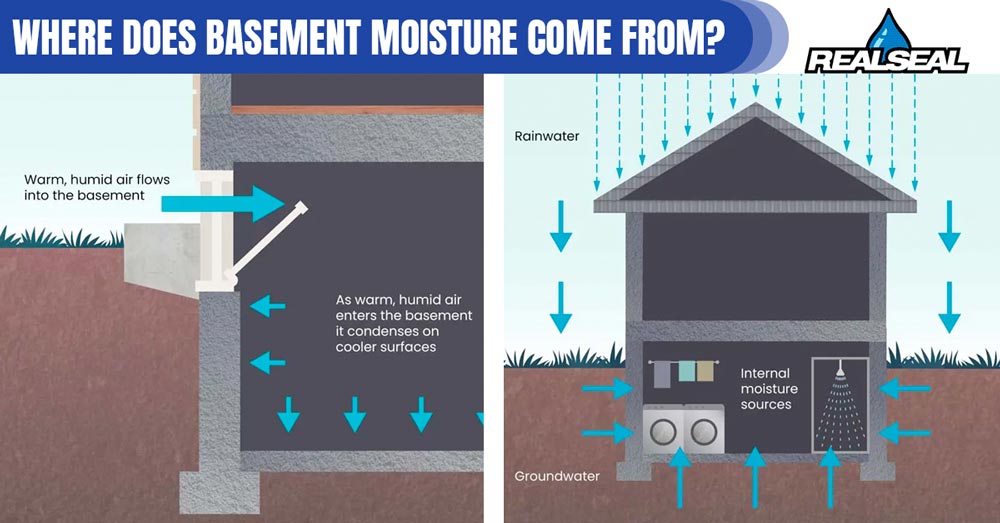
Why You Don’t Want a Humid Basement
A humid basement is a breeding ground for mold and mildew, posing a health risk for anyone living in the house. Once mold starts to grow, it can be difficult and costly to remove, often requiring professional help to get rid of it entirely.
Excess humidity can also attract pests such as cockroaches, termites, and dust mites, all of which can cause damage to your home and negatively impact your health.
Additionally, an overly humid basement could increase energy bills, as air conditioning units and dehumidifiers may need to run more often to control the air quality and temperature.
For more information, see How To Fix A Damp Basement In An Older Home.
Signs the Humidity Level in Your Basement Is Too High
Signs your basement humidity level is too high include the following:
- Condensation – One of the most obvious signs that your basement humidity level is too high is the presence of condensation on windows and walls. This occurs when moist air comes into contact with cooler surfaces, causing tiny droplets of water to form. Over time, this can lead to staining and even water damage if left unchecked.
- Musty odor – Another sign of high humidity in your basement is the presence of musty odors. These unpleasant smells are often caused by mold and mildew growth, which can thrive in damp environments. If you smell a musty odor from your basement, you likely have a humidity problem that must be addressed.
- Efflorescence – Another indicator of high humidity is the presence of efflorescence on the walls, which appears as a powdery white substance that forms when salts in the concrete or masonry become dissolved in water and then deposited on the surface. If left unaddressed, efflorescence can weaken the structural integrity of your foundation.
- Water stains on walls – Water stains on the walls can also be a sign of excess moisture, as they typically form when water penetrates the surface and either dries on the surface or evaporates, leaving behind a visible mark.
- Water seeping through the foundation wall – One of the most evident indications of high humidity in your basement is water seeping through a foundation wall.
- Visible mold growth on surfaces such as carpets and wooden structures.
- Standing water on the basement floor.
- A ring of dampness at the base of the basement walls.
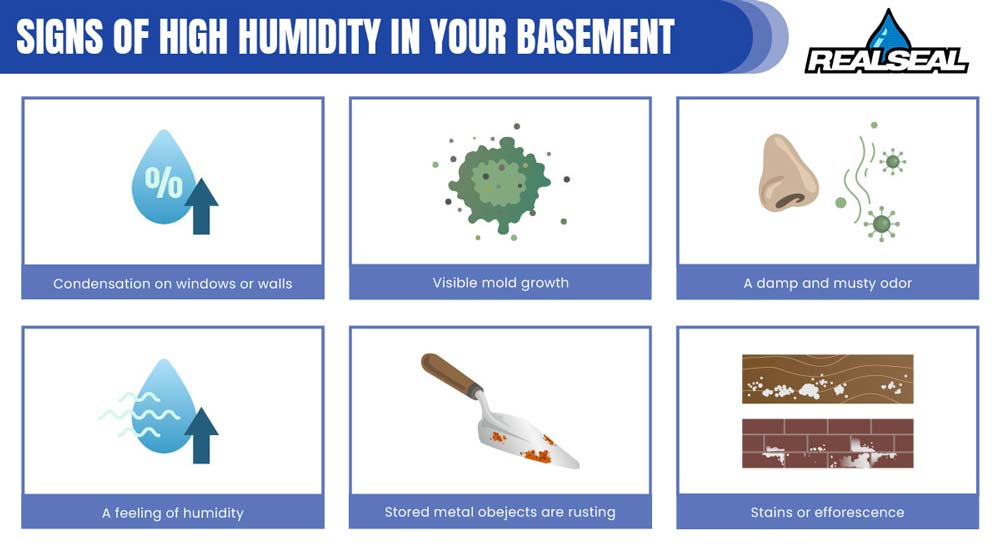
How To Lower Your Basement’s Humidity Level
The good news is there are several effective ways to lower your basement’s humidity level and keep your home healthy and safe. These include the following:
- Install a drain tile system – A drain tile system is one of the most effective ways to keep water away from your basement. A drain tile system consists of a buried perforated drainage pipe that collects groundwater and directs it away from your home’s foundation.
- Use a dehumidifier – A dehumidifier is a device that removes excess moisture from the air, creating a dry and comfortable environment. Be sure to choose a dehumidifier with the appropriate capacity for your basement size.
- Seal any cracks in the foundation wall – Cracks in your foundation can allow water to seep in and cause humidity levels to rise. Patch any cracks you find in the foundation wall.
- Close basement windows during the summer – Though it may seem counterintuitive, leaving your basement windows open during the summer months can increase the humidity levels in your home because the warm, humid air will condense on cooler surfaces.
- Regrade the yard – If your yard slopes towards your home, groundwater will drain toward the foundation, seep into your basement, and raise humidity levels. Regrading the yard so water flows away from your home can prevent this.
- Fix plumbing leaks – Leaking pipes can cause a significant amount of unwanted moisture and humidity in your basement. Make sure all plumbing leaks are sealed off to avoid such issues.
- Clean gutters regularly – Clogged gutters can cause water to spill over the side of the house, soak the ground around the foundation, and, from there, find its way into the basement. Regular cleaning and maintenance of your gutters can prevent this from occurring.
- Use downspout extensions – Extensions on your downspouts can help direct rainwater farther away from your home’s foundation before release, preventing excess moisture from getting into your basement.
- Ensure appliances such as clothes dryers are vented – Clothes dryers generate a lot of moisture; if they’re not correctly vented, that moisture will remain in your basement. Be sure to have all appliances properly installed and vented to the outside.
- Use exhaust fans for full bathrooms in the basement – Bathrooms generate a lot of moisture. If they aren’t properly ventilated, that moisture can lead to humidity issues in your basement. Installing an exhaust fan in your bathroom can help keep the air dry and reduce humidity.
- Keep water-hungry vegetation away from the foundation – If plants or trees grow close to your home’s foundation, they could draw moisture toward your basement. Keeping them at a safe distance can help prevent unwanted moisture from seeping into the basement.
If you’re concerned about the ideal basement humidity level in your Chicagoland home, contact The Real Seal today to schedule a basement evaluation.
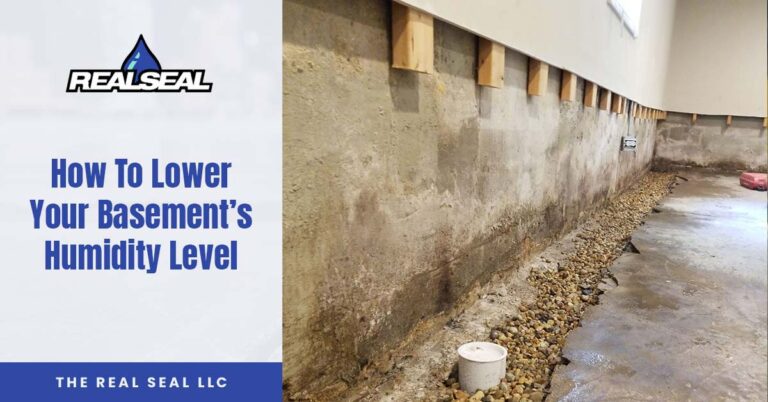
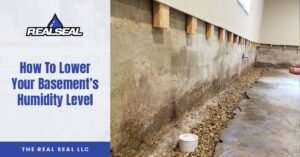
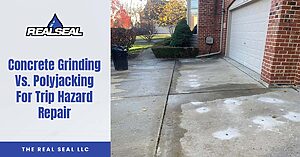
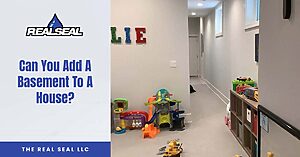
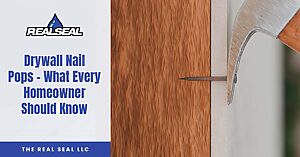
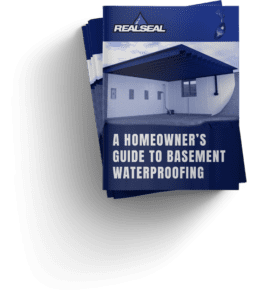

2 Responses
very good post, i actually love this website, carry on it
Thank you!